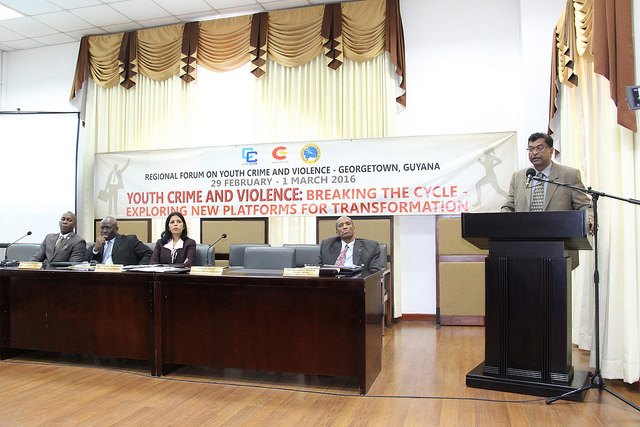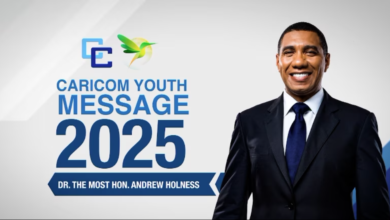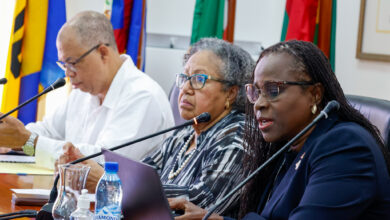Guyana’s Minister for Public Security, Hon. Khemraj Ramjattan, called for the crafting of a culture that makes youth assets rather than liabilities. The Minister made this call at the Official Opening of the two-day Regional Forum on Youth Crime and Violence which opened today, 29 February 2016, in Georgetown, Guyana, under the theme: Youth Crime and Violence; Breaking the Cycle Exploring New Platforms for transformation.
The Minister said that ‘children should be in schools and not jails” and spoke out against crime prevention approaches which over relied on the justice criminal system, while neglecting other complementing and effective prevention approaches. In this context, he noted the need for “juvenile reforms, and called for its legislation. The minister put forward a number of proposals including for the political commitment for resources” to respond to this issue.
The urgent need to break the perpetuating cycle of youth crime and violence through a drastic change in culture at all levels whether individual, family or institution, and the various solutions for doing so were reiterated by each speaker.
CARICOM Deputy Secretary-General, Dr. Manorma Soeknandan noted that CARICOM was not silent on the issue. She however reiterated the crucial need “to perfect the art of meaningful cooperation and coordinated action between and among ministries and departments to achieve effective solutions …”
For the Caribbean Development Bank representative, Dr. Martin Baptiste, some of the solutions lay in seeing that “the cycle of violence not started”, hence the need to include children in the process. These solutions also resided in going “beyond testing to ensure that the lessons were not only learned, but applied and that those at risk benefitted. “It is not about activities that are effective, but it is about helping young people to construct their dreams”, he said.
Dr. Astell Collins BD1 Development Leader who delivered a “message” noted “that there has to be an interdependent intergenerational experience between youth and adult. ”Humility dictates there was someone before you to prepare the way for you and you have to prepare the way for someone to follow”, he said
Noting that a country’s richest resource was in the grave yard, Dr. Collins charged the gathering of students, other youth, policy makers, representatives of civil society and other stakeholders to consider “who you are, refine who you are and then be of service”.
In a video message, Spain’s Ambassador His Excellency José María Fernández López de Turiso, Plenipotentiary Representative of Spain to CARICOM, alluded to the CARICOM/Spain Joint Fund support for the reduction of youth on youth violence in schools in the Caribbean and to the concrete results of the project to the benefits of the communities.
The Official Opening of the Forum was chaired by CARICOM Secretariat Assistant Secretary-General for Human and Social Development, Dr. Douglas Slater. The Forum, funded by the Government of Spain and the Caribbean Development Bank, is an outcome of the two-year CARICOM/Spain Project: Youth on Youth Violence in the Caribbean. This project is now being piloted in five member states: Antigua and Barbuda, Jamaica, St. Kitts and Nevis, Saint Lucia and Trinidad and Tobago.
The decisions of the Forum will be submitted to the Twenty-Ninth of the Community Council for Human and Social Development (COHSOD), scheduled for 3-4 March 2016, Georgetown, Guyana.






